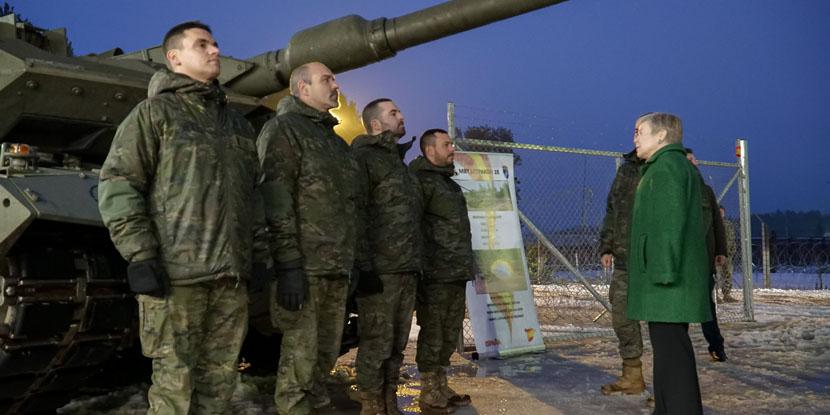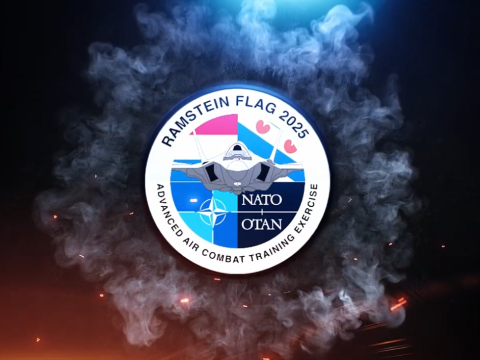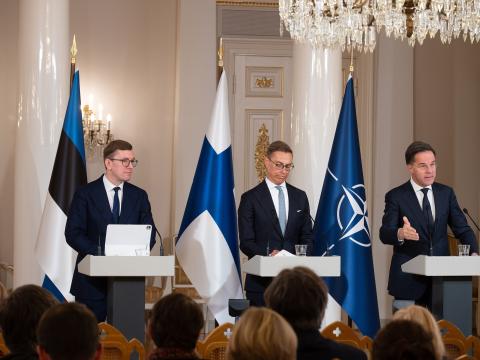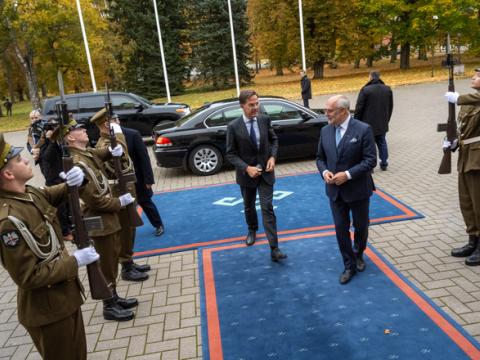NATO Wants to Work With Russia on Security
NATO views Russia as a key to regional security and seeks to work with the country on a variety of issues. However, the alliance views some Russian actions with suspicion, and recent statements from Kremlin leaders are not viewed as constructive, according to a leading NATO general.
The resurgent national power is involved in many areas of importance to NATO. And other countries, such as China, India and Pakistan, have concerns in these areas and must be included in discussions. But their role tends to be in support of their own regional interests, whereas Russia is making moves near the borders of NATO members.
Gen. Petr Pavel, CZA, chairman of the NATO Military Committee, is stepping down at the end of his term this summer. Speaking to a small media gathering in Washington, D.C., he emphasized that NATO still views Russia as an important potential partner, even though the alliance is concurrently taking steps to counter recent aggressive moves on its eastern flank.
Gen. Pavel stated that Russian President Vladimir Putin’s March 1 declaration of new nuclear weapons is “not exactly what we would expect is the foundation for dialogue.” He described it as a serious reason for concern, adding that NATO must address it on its own terms. NATO must reconsider its nuclear deterrence, which had been largely neglected for two decades, as an agenda item.
However, Gen. Pavel also warned against overreacting to President Putin’s words. The address to the Russian nation can be understood in the context of pre-election campaigning, coupled with traditional Russian patriotism, the general pointed out.
“It also demonstrates the need for extensive dialogue with Russia on disarmament, especially in the nuclear area,” Gen. Pavel declared, adding that “all these developments may turn dangerous if they are not handled thoughtfully.” He cited the possibility of both sides tumbling into a new nuclear arms race.
Russia’s moves into Ukraine and Georgia have generated discord with NATO. Gen. Pavel stated: “It is difficult to sit at the table knowing there are occupied territories in Georgia, support from Russia for separatists in Donbass and [that] Crimea was occupied illegally, along with measures and narratives that are creating tensions.” He called for more “common will” toward constructive dialogue, and this must be accompanied by concrete acts.
The general stressed that Ukraine is the biggest problem between NATO and Russia. He does not foresee an improvement in relations until the Ukrainian problem is addressed. One step in the right direction would be to allow a mission by the U.N. or the Organization for Security and Co-operation in Europe (OSCE) to monitor the situation in Donbass and help restore normalcy in the troubled region.
The general emphasized that NATO has not seen any open aggression against its Baltic members. Tension in the region has grown with an increased Russian military presence, but no territorial violations have taken place. Occasional airspace intrusions tend to be harmless accidents based on human error or technical failure rather than provocative moves, he stated.
NATO increased its presence across Baltic members with rotational groups of forces to demonstrate its resolve to act if necessary. The alliance has decided to keep its presence below a level threatening to Russia, Gen. Pavel pointed out. Both sides tend to view forces at brigade and above as a military threat, which is why NATO has kept its rotating Baltic presence below that level.
Describing himself as a “cautious optimist,” Gen. Pavel said there was a chance for better relations between NATO and Russia. However, he called for more willingness on Russia’s part to take steps that would assure the alliance of its intentions to improve relations.
But Russia is not the only power NATO must work with to solve geosecurity challenges. In cyberspace, both Russia and China will play an important role, the general offered. Much remains to be established in cybersecurity, in particular, rules that define when a cyber attack becomes a warlike act. NATO, Russia and China need to establish parameters to reduce ambiguities in cyberspace; they must establish “rules of cyberspace.” Both cyber and hybrid combat—combining cyber and kinetic operations—need to be addressed, and the general called for an “impulse” to move the dialogue forward.
NATO does not have a policy on offensive cyber operations, and it is not considering developing an alliancewide cyber offense, Gen. Pavel emphasized.
In Afghanistan, where NATO has a presence through its Resolute Support Mission (RSM), the successor to the International Security Assistance Force, the alliance is facing Russian meddling to counter efforts at establishing a strong Afghan government. Some news media outlets have reported that Russia is arming the Taliban. Gen. Pavel said Russia has suggested that it is ready for discussions with NATO on how to proceed with Afghanistan, although he added that NATO does not yet see any significant progress on how to proceed. He said China, India and Pakistan also should be part of any solution to the Afghanistan problem.
Afghanistan has reached a strategic stalemate, the general continued. Part of the RSM’s effort includes convincing the Taliban that it cannot prevail on the battlefield as well as bringing it into the Afghan peace process, Gen. Pavel said. Despite some favorable indications, the alliance has not seen any credible presence in the Taliban to take part in negotiations.
Russia, China, India and Pakistan must help create conditions that support this process for negotiations, he continued. The general cited a link between the Haqqani network in Afghanistan and Pakistan, and this issue generates tension among crucial allies. A member of the Haqqani network is the second in command in the Taliban, so the network effectively is driving the Taliban, the general offers. While NATO has seen some positive moves in this area, the alliance continues to see cross-border clashes between Pakistani and Afghan forces, Gen. Pavel noted. All these points must be addressed by the involved countries.





Comments